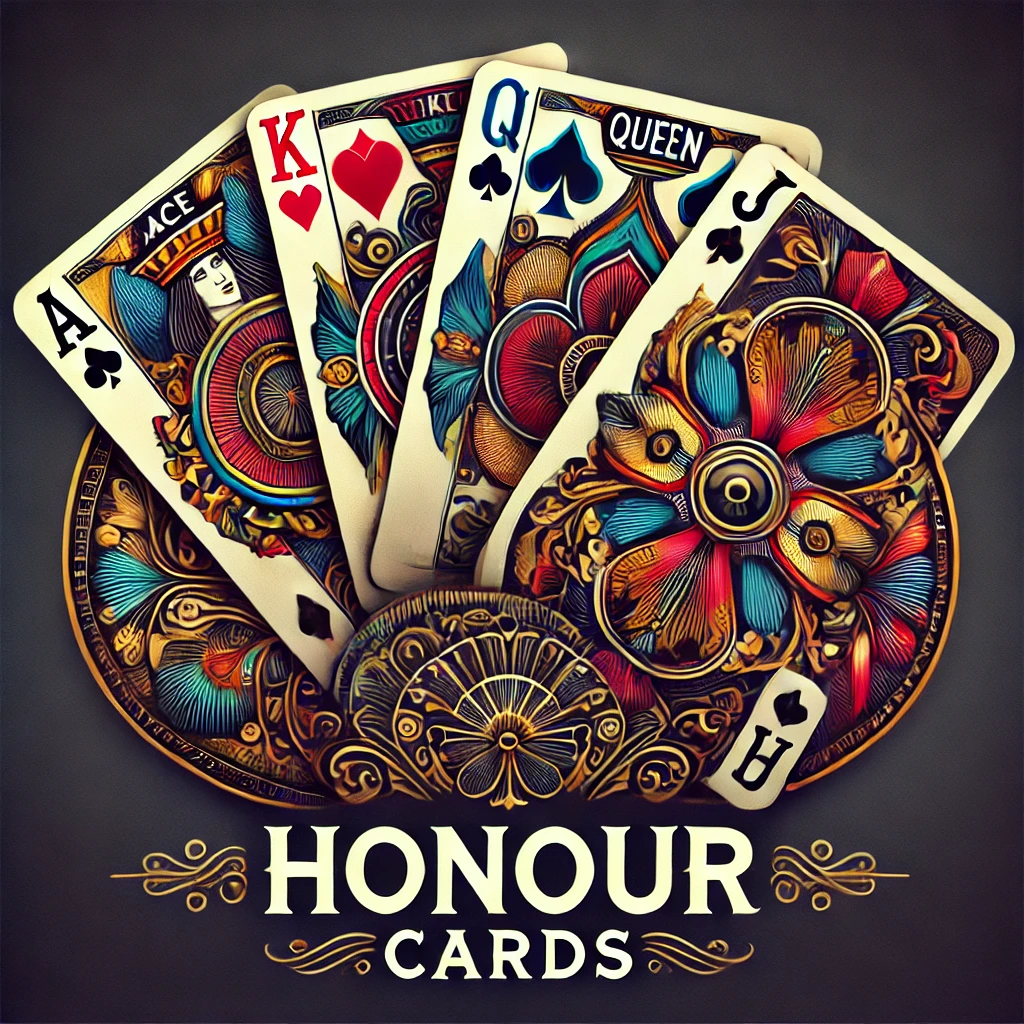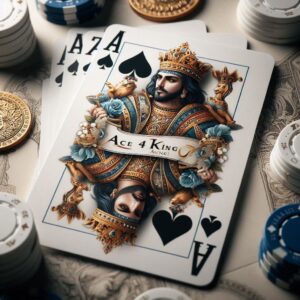Table of Contents
ToggleMastering Honour Cards: The Power, Prestige, and Strategy Behind Aces, Kings, Queens, and Jacks

Introduction to Honour Cards
Honour cards in a deck are more than mere playing pieces—they symbolize power, prestige, and tactical depth. Found in nearly every standard deck of cards, these cards often represent authority, rank, and strategy. In various card games, from poker to bridge, honour cards play a critical role in determining a player’s strength and capacity for strategic maneuvering.
What Are Honour Cards?
Honour cards are those that stand above the rest in terms of value and influence. Typically, these are the Ace, King, Queen, and Jack. Unlike number cards, which merely serve as stepping stones in many games, honour cards carry an innate prestige and value that can dramatically alter the course of play.
Types of Honour Cards
The Ace
The Ace is a unique card that holds a dual identity in several games. It can be the highest-ranking card or the lowest, depending on the rules of the game. The versatility of the Ace is what makes it one of the most sought-after cards in any hand.
The King
The King, symbolizing ultimate power, usually ranks just below the Ace. In card games, the King often represents a steady and reliable force, a card that commands respect when drawn.
The Queen
As the only female honour card, the Queen represents strength, resilience, and wisdom. Often underestimated, the Queen plays an essential role in strategies, especially when combined with other honour cards.
The Jack
The Jack, although ranked lower than the Queen, is vital to many card strategies. It is often viewed as the workhorse of honour cards, subtly influencing game outcomes with its presence.
Rankings of Honour Cards
Honour cards do not hold uniform rankings across all games. In some games, such as poker, the Ace takes precedence, while in others, such as Rummy, Kings and Queens may hold greater value. Understanding these nuances in rankings is essential for mastering any card game.
Role of Honour Cards in Bridge
Bridge is one of the most renowned games where honour cards shine. The scoring system in Bridge places significant emphasis on these cards, with entire strategies revolving around the presence and absence of honour cards in a player’s hand.
Honour Cards in Poker
In Poker, honour cards are integral to creating high-value hands. A pair of Kings or Aces can shift the balance of power in a single round. Moreover, bluffing techniques often involve the use of honour cards to project a stronger hand.
The Power of Aces

One of the most significant aspects of the Ace is its dual role as the highest and lowest card. In games like Poker or Blackjack, having an Ace can mean the difference between victory and defeat. Strategies involving the Ace often revolve around its flexibility.
Kings: The Rulers of the Deck
Kings are often the embodiment of authority in card games. In many games, the King stands just below the Ace but still commands a formidable presence. Historically, Kings have been seen as symbols of power, reflecting their esteemed position in the deck.
Queens: The Strength of Femininity in Cards
Queens are not just symbolic but also practical in terms of strategy. Their presence in a hand can turn the tide of a game. Historically, Queens have been seen as the embodiment of grace and cunning, making them indispensable in card play.
Jacks: The Underrated Honour Cards
Jacks may be ranked lower than other honour cards, but their role in gameplay should not be underestimated. In many card games, Jacks serve as pivotal pieces, often tipping the scales when played at the right moment.
Honour Cards and Probability
The likelihood of drawing an honour card can significantly impact game strategies. Whether you’re playing poker, bridge, or solitaire, knowing the odds of pulling an Ace, King, Queen, or Jack can enhance your decision-making process and increase your winning chances.
The Psychological Impact of Honour Cards
Honour cards tend to evoke strong emotional responses. Players often feel a surge of confidence upon drawing an Ace or a King. Conversely, missing out on honour cards can lead to frustration or a sense of inferiority during gameplay.
Honour Cards in Tarot
In Tarot, honour cards align with major arcana, carrying rich symbolic meaning. The Ace, King, Queen, and Jack represent different aspects of life and fate. They serve not only in divination but also as powerful archetypes.
Design and Art of Honour Cards
The visual appeal of honour cards has evolved over time. Historically, these cards were adorned with intricate designs symbolizing royalty and power. Modern decks continue this tradition, with some even featuring artistic reimaginings of these symbols.
Honour Cards in Classic Solitaire
In solitaire, honour cards play a crucial role in shaping strategy. The placement and movement of Aces, Kings, Queens, and Jacks can make the difference between a completed game and a frustrating stalemate.
Cultural and Historical Significance of Honour Cards
Honour cards have always been reflections of social structures. Kings, Queens, and Jacks symbolized their real-world counterparts, while the Ace represented both the commoner and the noble, depending on the game’s rules.
Honour Cards and Superstition
Honour cards have long been associated with myths and superstitions. From being considered lucky omens to being used in fortune-telling, these cards carry an air of mystery that transcends their functional role in games.
Honour Cards in Regional Card Games
In many regional card games, honour cards hold unique places of importance. Rummy, for instance, gives significant weight to these cards, while European games often weave intricate strategies around their use.
Strategic Use of Honour Cards in Team Games
In games where team play is involved, such as bridge or certain variations of Rummy, the strategic use of honour cards can be a form of communication between partners, silently signaling the strength of a hand.
Conclusion

Honour cards remain a cornerstone in the world of card games, representing not just high value but the essence of strategy, history, and cultural significance. Understanding their importance can elevate one’s gameplay, adding layers of depth and skill to the art of playing cards.
FAQs
What are Honour Cards in a deck?
Honour cards in a deck refer to the Ace, King, Queen, and Jack. These cards are often of higher rank and value compared to the number cards and play a crucial role in determining the outcome of many card games.
How are Honour Cards ranked?
The typical ranking of honour cards from highest to lowest is Ace, King, Queen, and Jack. However, some games may assign the Ace either a high or low position, depending on the rules.
Why are Honour Cards important in card games?
Honour cards often carry more value than regular number cards and can shift the balance of power in a hand. Their strategic use is essential for success in games like Poker, Bridge, and Rummy.
What is the role of Honour Cards in Poker?
In Poker, honour cards are key to forming high-value hands such as pairs, full houses, and straights. Aces and Kings, in particular, are highly desirable and can significantly influence a player’s chance of winning.
Do Honour Cards have symbolic meaning in different cultures?
Yes, honour cards often represent royalty, authority, and power in various cultures. In Tarot, for instance, they carry deeper symbolic meanings related to fate, life challenges, and personal qualities.
